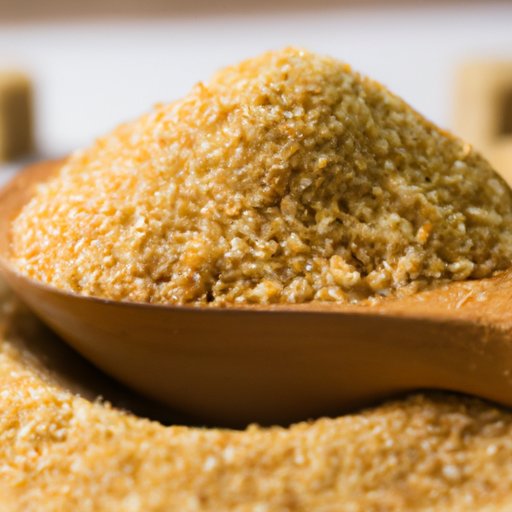Introduction
When it comes to sweeteners, brown sugar is one of the most popular options. But is it really a healthier option than refined white sugar? In this article, we’ll explore the nutritional value and health benefits of brown sugar, as well as potential risks associated with its consumption. We’ll also look at some natural alternatives to brown sugar as sweeteners.
What is Brown Sugar?
Brown sugar is a type of sugar made from either cane or beet juice. The juice is boiled and then mixed with molasses, which gives it its distinctive color and flavor. Brown sugar is available in light and dark varieties, with the darker version containing more molasses.
Brown sugar is often thought of as a healthier alternative to refined white sugar because it contains small amounts of calcium, iron, and potassium. However, according to registered dietitian Cynthia Sass, “the amount of minerals in brown sugar is so miniscule that it has no significant nutritional benefit.”
Nutritional Value of Brown Sugar
Brown sugar provides 4 calories per gram, which is the same as refined white sugar. It also contains 16 grams of carbohydrates per tablespoon, which is slightly higher than the 15 grams found in white sugar. Brown sugar does contain trace amounts of vitamins and minerals, but these are not enough to make a significant contribution to your overall health.

Health Benefits of Substituting Brown Sugar for Refined White Sugar
While there are no major nutritional differences between brown sugar and white sugar, there are some potential health benefits associated with using brown sugar instead of white sugar. One of these is the lower glycemic index (GI) of brown sugar. The GI is a measure of how quickly a food raises blood sugar levels. Brown sugar has a GI of 64, while white sugar has a GI of 68.
A study published in the journal Diabetes Care found that people who consumed foods with a lower GI had a lower risk of developing type 2 diabetes. This suggests that substituting brown sugar for white sugar could potentially help reduce the risk of diabetes.

Role of Brown Sugar in a Balanced Diet
It’s important to remember that brown sugar should still be consumed in moderation. While it may have a lower GI than white sugar, it still contains a lot of calories and carbohydrates, which can lead to weight gain if consumed in excess. To ensure you’re getting all the nutrients you need, it’s important to limit your intake of added sugars, including brown sugar, and focus on whole foods like fruits, vegetables, and whole grains.
It’s also important to limit your consumption of other types of sugar, such as high-fructose corn syrup and honey. These can have a similar effect on blood sugar levels as brown sugar and should be used sparingly.

Potential Risks of Consuming Too Much Brown Sugar
Consuming too much brown sugar can have a number of negative effects on your health. One of the most obvious is weight gain. Brown sugar is high in calories and carbohydrates, which can lead to an increase in body fat if consumed in excess. This can increase the risk of developing a number of chronic diseases, such as heart disease, stroke, and type 2 diabetes.
In addition to weight gain, consuming too much brown sugar can also lead to an increase in blood sugar levels. This can put strain on the body’s insulin production and can potentially lead to insulin resistance. Furthermore, brown sugar can contribute to tooth decay, as the bacteria in the mouth feed on the sugar and produce acids that can erode the enamel of the teeth.
Natural Alternatives to Brown Sugar as Sweeteners
If you’re looking for a sweeter alternative to brown sugar, there are several natural options you can try. Honey is a great choice as it contains antioxidants and can have a positive effect on cholesterol levels. Maple syrup is another good option, as it contains minerals such as zinc and magnesium. Coconut sugar is also a good option, as it has a lower GI than white sugar and contains some vitamins and minerals.
Conclusion
Brown sugar can be a healthier alternative to refined white sugar, as it has a lower glycemic index and can potentially reduce the risk of developing type 2 diabetes. However, it’s important to remember that it should still be consumed in moderation, as consuming too much can lead to weight gain and increases in blood sugar levels. If you’re looking for a natural sweetener, honey, maple syrup, and coconut sugar are all good options.
In conclusion, brown sugar can be part of a healthy diet when consumed in moderation. Limiting your intake of other sugars, such as high-fructose corn syrup and honey, can help ensure you get all the nutrients you need without overconsuming added sugars. Finally, natural alternatives such as honey, maple syrup, and coconut sugar are great options if you’re looking for a sweeter alternative to brown sugar.
(Note: Is this article not meeting your expectations? Do you have knowledge or insights to share? Unlock new opportunities and expand your reach by joining our authors team. Click Registration to join us and share your expertise with our readers.)
